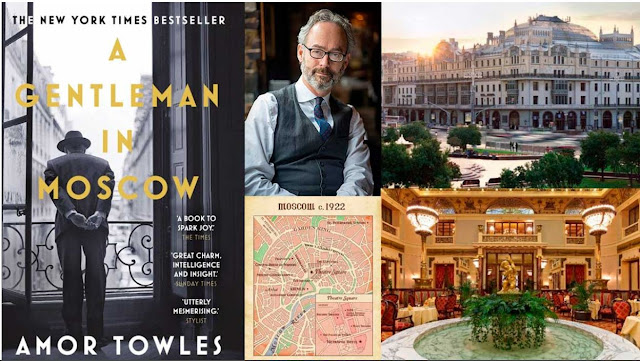 |
| See below for photo rights |
This book has been highly praised by a few of my book reader friends, and then scowled upon by them, over their failure at list jacking, and my postponing of its reading. Yet, finally, what triggered my "reading" of it was my stumbling upon of an audio rendition, a most perfect one I feel, carried out by that award winning narrator, Nicholas Guy Smith.
And how did I find it ? It was the most wonderful of books, as it contains a little bit of everything, just like one of the meals that the Count Rostov took so much pleasure in. After all, it is an account of a man under house arrest for thirty-plus years, but the lucidity of his thoughts, his conversations, and his mastering of circumstances - and the details of it - is an absolute treat to a book lover.
The book's central philosophy could be stated as;
“if a man does not master his circumstances then he is bound to be mastered by them.”
The philosophic, is but one aspect of the book which brings the reader much joy. Although, such thoughts aren't common, it is present in the just correct dosage, to make the reader think. For, consider this:
“He had said that our lives are steered by uncertainties, many of which are disruptive or even daunting; but that if we persevere and remain generous of heart, we may be granted a moment of lucidity—a moment in which all that has happened to us suddenly comes into focus as a necessary course of events, even as we find ourselves on the threshold of the life we had been meant to lead all along.”
Aha! Lucidity is the key word here, when after a long held resolve, and abiding with a bowed head to make best out of his or her lot, a single event, or person, makes all that had happened, one's reaction to them, as well as how proactively one tried to master it, meaningful.
"For pomp is a tenacious force. And a wily one too. How humbly it bows its head as the emperor is dragged down the steps and tossed in the street. But then, having quietly bided its time, while helping the newly appointed leader on with his jacket, it compliments his appearance and suggests the wearing of a medal or two. Or, having served him at a formal dinner, it wonders aloud if a taller chair might not have been more fitting for a man with such responsibilities. The soldiers of the common man may toss the banners of the old regime on the victory pyre, but soon enough trumpets will blare and pomp will take its place at the side of the throne, having once again secured its dominion over history and kings."
Even early tracks of the cold war can be found for the close reader.
“As I’ve said to you before, we and the Americans will lead the rest of this century because we are the only nations who have learned to brush the past aside instead of bowing before it. But where they have done so in service of their beloved individualism, we are attempting to do so in service of the common good.”
Subtle references, by way of confidence to escape towards a freer nation are also found in these pages. So, while she may boast of the world's first nuclear power station, and its growth to the largest exporter of many items, liberty in one's action is upheld more than all the collective achievements.
“Sasha, I know you don’t want to accept the notion that Russia may be inherently inward looking, but do you think in America they are even having this conversation? Wondering if the gates of New York are about to be opened or closed?“You sound as if you dreamed of living in America.”
“Everyone dreams of living in America.”
Which brings us to the suffering of the Russian public. Most of all, of those who were committed to the cause, has been captured, while maintaining a tone of indifference at times - as the times demanded. Nina ( and her husband), Mishka - and quite obviously the Count Rostov although he is a "former person" - and even sundry characters like Nikolai Petrov.
Thus, over a period of thirty years, Alexander Ilyich Rostov, masters his circumstances, finds an aim to live for, enjoys intimacy, and is politically literate of what happens around him. These incidents are told us by the most wonderful use of the English language, which can only compliment the notion of a gentleman - for what is a gentleman, but an easy chair. Thus, this book is like an easy chair for the lover of reading. True, I used the audio format, for which I am not regretful. I usually spent 20 minutes or so on my kindle, doing a skim reading, just to see how the French, ( or the Italian, as the case was) I heard was written, and also its precise meaning ( for the generic could be gleaned from within the context) - enjoying the nuances as it were. The audio rendition, didn't leave out the foot notes, which made the listening experience all the more rewarding. The only reason am docking half a star from this book, is a certain precise planning towards the end of the book ( the details of which I don't go to, to avoid spoilers.)
Rating: ****1/2
Year of Publication: 2017
Photo rights: https://www.iwa-prague.com/book-review-a-gentleman-in-moscow
No comments:
Post a Comment